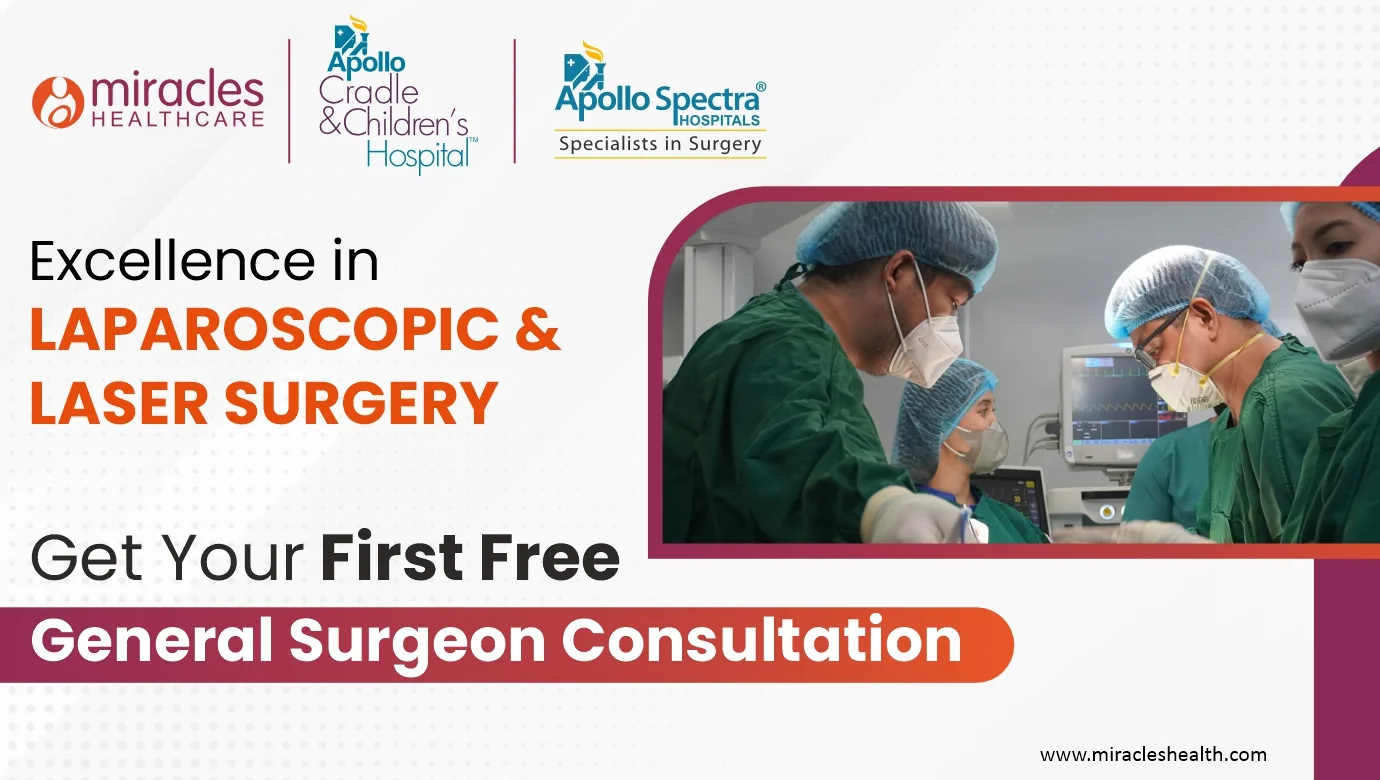General Surgery Conditions We Treat
Comprehensive Care for Your Health

Laser surgery is a minimally invasive technique that involves using a highly focused beam of light to perform precise and minimally invasive procedures across various medical fields, including ophthalmology, dermatology, general surgery, dentistry, urology, gynecology, and more. It offers advantages such as reduced bleeding, and faster recovery times. However, the effectiveness and safety of laser surgery depend on factors such as the type of procedure, patient suitability, and surgeon.
Laser surgery is a minimally invasive medical procedure that uses a laser to cut, burn, or vaporize tissues. This is employed in various medical fields such as ophthalmology, dermatology, dentistry, and cosmetic surgery, among others. The laser emits a highly focused beam of light that can precisely target the tissue being treated while minimizing damage to surrounding areas. Different types of lasers are used depending on the specific procedure and the characteristics of the tissue being treated.
There are various types of laser surgery, each tailored to specific medical applications. Here are some common types:
Laser Surgery of Piles (Hemorrhoids): Involves using laser energy to shrink and seal off swollen blood vessels in the anal area, reducing pain and bleeding associated with hemorrhoids.
Laser Treatment for Fissure: Utilizes laser energy to precisely remove damaged tissue and promote healing in anal fissures, often resulting in faster recovery and reduced risk of recurrence.
Laser Surgery of Fistula: Involves using lasers to destroy abnormal tissue tracts and seal off fistula openings, promoting closure and reducing the risk of infection.
Laser Surgery of Pilonidal Sinus: Uses laser energy to remove infected tissue and drain abscesses in the pilonidal sinus, helping to heal the wound and reduce the risk of recurrence.
Laser Skin Resurfacing: Helps reduce wrinkles, scars, and blemishes by removing layers of skin using a laser. It can also stimulate collagen production for smoother skin.
Laser Hair Removal: Targets hair follicles with high-intensity light, damaging them and inhibiting future hair growth.
Laser Liposuction: Uses lasers to liquefy fat before removal, making the procedure less invasive compared to traditional liposuction.
Laser Ablation: Destroys abnormal tissues, such as tumors or precancerous lesions, by vaporizing them with a laser.
Laser Dentistry: Involves using lasers for procedures like gum disease treatment, cavity removal, and teeth whitening.
Laser Treatment for Vascular Lesions: Targets blood vessels to treat conditions like spider veins, port-wine stains, and hemangiomas.
Laser-Assisted Urology Procedures: Includes treatments for kidney stones, prostate enlargement (BPH), and certain cancers.
Laser Treatment for Gynecological Conditions: Used for procedures like vaginal rejuvenation, treatment of cervical dysplasia, and removal of genital warts.
Laser Surgery of Varicose Veins: A thin laser is inserted through a small cut near the ankle/knee. Laser heals & seals from within the vein causing it to collapse under USG guidance.
Laser Surgery of Gallbladder Stone: Utilizes laser technology to fragment stones, making removal less invasive and recovery faster.
Laser Surgery for Hernia: Uses laser precision to repair hernias, reducing recovery time and minimizing scarring.
Laser surgery continues to advance, offering efficient solutions across various medical fields with less pain, fewer complications, and faster recovery.
Laser surgery and open surgery differ in terms of technique and recovery. Laser surgery, being minimally invasive, involves using a focused beam of light to treat conditions with precision, resulting in minimal incisions, less pain, and faster recovery times compared to traditional open surgery. Even, open surgery requires larger incisions, often leading to more pain, longer hospital stays, and extended recovery periods. While both approaches have their merits, laser surgery is generally preferred when feasible due to its reduced invasiveness and quicker recovery.
Laser operation is utilized to treat a wide range of medical conditions across various specialties. It offers several advantages over traditional surgical techniques, making it a preferred option in many cases. Some of the key advantages include:
Precision: Laser technology allows for precise targeting of tissues, and minimizing damage to its surrounding areas. This precision is especially beneficial for delicate or intricate procedures.
Minimally Invasive: Laser surgery often involves minimal incisions or no incisions at all, resulting in less trauma, reduced pain, and faster recovery times compared to traditional surgery, which can lead to shorter hospital stays.
Reduced Bleeding: The heat generated by the laser can help cauterize blood vessels during surgery, leading to less bleeding and a lower risk of complications such as blood loss and transfusions.
Less Scarring: Laser surgery can result in less scarring compared to traditional surgery, as the precise targeting of tissues can minimize damage to surrounding healthy tissue.
Faster Healing: Laser energy can promote faster healing by stimulating tissue regeneration and reducing inflammation. This can result in shorter recovery times and a quicker return to normal activities for patients.
Reduced Risk of Infection: The heat generated by the laser can help sterilize the treatment area, reducing the risk of infection during and after surgery.
Outpatient Procedures: Many laser surgeries can be performed on an outpatient basis, meaning patients can return home the same day. This can reduce healthcare costs and inconvenience associated with hospital stays.
Preparing for laser surgery typically involves several steps to ensure the procedure goes smoothly and safely. Here are some general guidelines:
Consultation: Schedule an online consultation with your general surgeon to discuss the procedure, potential risks, benefits, and any preoperative instructions specific to your case.
Medical History: Provide your surgeon with a complete medical history, including any pre-existing medical conditions, allergies, medications, and previous surgeries.
Tests and Exams: Your surgeon may order preoperative tests or exams, such as blood tests, imaging studies, or a physical examination, to assess your overall health and identify any potential risks.
Medications: Inform your surgeon about all medications you are taking, including prescription drugs, over-the-counter medications, supplements, and herbal remedies. Your surgeon may advise you to stop certain medications before surgery, especially those that can increase the risk of bleeding or interfere with anesthesia.
Smoking and Alcohol: If you smoke, you may be recommended to quit smoking before surgery, as smoking can impair healing and increase the risk of complications. Similarly, limit alcohol consumption in the days leading up to surgery.
Hygiene: Follow any instructions provided by your surgeon regarding preoperative hygiene, such as showering with a special soap or avoiding lotions, perfumes, and makeup on the day of surgery.
Fasting: Depending on the type of laser surgery and anesthesia used, you may need to fast for a certain period before the procedure. Your surgeon will provide specific instructions regarding fasting and fluid intake.
By following these preparation guidelines in consultation with your surgeon, you can help ensure a smooth and successful laser surgery experience.
The specific procedure for laser operation can vary widely depending on the medical condition being treated. However, here's a general overview of what typically happens during laser surgery:
Preparation: Before the surgery starts, you will receive anesthesia, either regional anesthesia to numb the area being treated or general anesthesia to make you unconscious during the procedure.
Laser Setup: The surgical team will prepare the laser equipment, ensuring that it is calibrated correctly and ready for use. Different types of lasers may be used depending on the specific procedure and the characteristics of the tissue being treated.
Treatment: Once everything is prepared, the surgeon will use the laser to precisely target and treat the affected tissues, following the predetermined treatment plan. The laser energy may be used to cut, vaporize, coagulate, or remove tissue, depending on the goals of the surgery.
Completion: Once the surgery is complete, the laser equipment will be turned off, and any necessary postoperative care will be provided.
After laser surgery, what you can expect largely depends on the type of surgery you have undergone and your circumstances. However, here are some general aspects to consider:
Recovery Room: You may spend some time in a recovery room immediately after surgery where medical staff will monitor your vital signs and ensure you are stable.
Pain and Discomfort: You may experience some pain, discomfort, or soreness in the treated area. Your surgeon may prescribe pain medications or recommend over-the-counter pain relievers to manage any discomfort.
Swelling and Redness: Swelling and redness around the treated area are common after laser surgery. This usually resolves within a few days to weeks, depending on the extent of the surgery.
Activity Restrictions: Your surgeon may provide specific instructions regarding activity restrictions, such as avoiding heavy lifting, strenuous exercise, or certain movements that could strain the treated area. Follow these instructions carefully to aid in healing and prevent complications.
Diet and Hydration: Depending on the type of surgery and anesthesia used, you may be advised to follow a specific diet or increase your fluid intake to promote healing and prevent dehydration.
Follow-Up Appointments: You'll likely need to schedule follow-up appointments with your surgeon to monitor your progress, remove any stitches or dressings, and ensure proper healing. Attend all appointments as scheduled and communicate any concerns or changes in your condition with your surgeon.
Wound Care: Follow any instructions provided by your surgeon regarding wound care, such as keeping the treated area clean and dry, changing dressings as needed, and avoiding activities that could disrupt healing.
Return to Normal Activities: Your surgeon will advise you on when it's safe to return to normal activities, such as work, school, and exercise. Follow their guidance to avoid complications and ensure a smooth recovery.
It's important to follow all postoperative instructions provided by your surgeon to ensure a smooth recovery and optimal outcome after laser surgery.
After laser surgery, proper care is essential to promote healing and reduce the risk of complications. Strictly adhere to any postoperative instructions provided by your surgeon. These instructions may include guidelines on wound care, activity restrictions, medications, and follow-up appointments.
Here are some general care instructions:
Wound Care: Keep the treated area clean and dry according to your surgeon's instructions. You may need to gently clean the area with mild soap and water and pat it dry with a clean towel. Avoid scrubbing or rubbing the treated area, as this could disrupt healing.
Dressing Changes: If your surgeon has applied dressings or bandages to the treated area, follow their instructions regarding when and how to change them. Keep the dressing dry and clean to prevent infection.
Medications: Take any prescribed medications as directed by your surgeon, including pain relievers, antibiotics, and any other medications to manage symptoms or prevent complications.
Pain Management: If you experience pain or discomfort after surgery, use pain relievers as recommended by your surgeon. Over-the-counter pain medications may be sufficient for mild pain, while prescription medications may be necessary for more severe pain.
Activity Restrictions: Follow any activity restrictions provided by your surgeon, such as avoiding heavy lifting, strenuous exercise, or certain movements that could strain the treated area. Gradually resume normal activities as advised by your surgeon.
Hydration and Nutrition: Stay well-hydrated and maintain a balanced diet to support healing and recovery. Drink plenty of water and eat nutritious foods rich in vitamins, minerals, and protein.
Avoid Smoking and Alcohol: If you smoke, avoid smoking during the healing process, as smoking can impair healing and increase the risk of complications. Similarly, limit alcohol consumption, as it can interfere with healing and medications.
Protect the Treated Area: Avoid exposing the treated area to direct sunlight and extreme temperatures.
Monitor for Complications: Keep an eye on the treated area for any signs of infection, such as increased redness, swelling, warmth, or discharge. Also, watch for other symptoms such as fever, severe pain, or worsening symptoms. If you notice any signs of complications, contact your surgeon immediately.
Follow-Up Care: Attend all scheduled follow-up appointments with your surgeon to monitor your progress and ensure proper healing. Discuss your concerns or changes in your condition.
By following these care instructions and staying in close communication with your surgeon, you can help ensure a smooth recovery and optimal outcome after laser surgery.
While laser surgery is generally considered safe and effective, like any medical procedure, it carries some risks and potential complications. The specific risks associated with laser surgery can vary depending on factors such as the type of surgery, the area being treated, and individual patient characteristics. Some common risks and complications of laser surgery may include:
Pain or Discomfort: Some patients may experience pain or discomfort during or after laser surgery, which can usually be managed with pain medications.
Bleeding: While laser surgery can often reduce bleeding compared to traditional surgery, some bleeding may still occur, especially during more extensive procedures.
Infection: There is a risk of infection at the surgical site following laser surgery. This risk can be minimized by following proper wound care instructions and taking prescribed antibiotics if necessary.
Scarring: While laser surgery can result in less scarring compared to traditional surgery, some scarring may still occur, especially in more invasive procedures or in patients with a tendency to form keloids.
Changes in Sensation: Laser surgery in certain areas of the body may cause temporary or permanent changes in sensation, such as numbness or tingling.
Damage to Surrounding Tissues: In rare cases, laser surgery may accidentally damage nearby tissues or structures, leading to complications such as nerve damage or organ perforation.
Delayed Healing: Some patients may experience delayed wound healing or prolonged recovery times after laser surgery, especially if they have underlying health conditions or if complications occur.
Allergic Reactions: Some patients may experience allergic reactions to anesthesia, medications, or other substances used during laser surgery.
Incomplete Treatment: In some cases, laser surgery may not completely resolve the underlying medical condition or may require additional treatments for optimal results.
The cost of laser surgery can vary widely depending on several factors. Here are some key factors that can influence the cost of laser surgery:
Type of Procedure: The specific type of laser surgery being performed will significantly impact the cost. Procedures can range from relatively simple and quick treatments to more complex and extensive surgeries.
Location: The cost of laser surgery can vary depending on where you are located geographically. Surgery costs tend to be higher in urban areas and regions with higher costs of living.
Surgeon's Experience and Reputation: The experience and reputation of the surgeon performing the laser surgery can influence the cost. Highly skilled and experienced surgeons may charge higher fees for surgery.
Hospital Fees: The cost of laser surgery may include fees for using the surgical facility. The hospital with advanced equipment and amenities may charge higher fees.
Anesthesia: The type of anesthesia used during laser surgery can impact the cost. Local anesthesia may be less expensive than general anesthesia, which requires additional monitoring and personnel.
Duration of Treatment: The complexity and duration of the treatment needed can affect the cost of laser surgery. More extensive procedures or treatments that require multiple sessions may incur higher costs.
Preoperative Testing and Consultations: Additional preoperative tests, consultations, or evaluations may be necessary depending on your health status and the nature of the surgery, which can increase the overall cost.
Postoperative Care and Follow-Up: The cost of laser surgery may include postoperative care and follow-up appointments to monitor your progress and ensure proper healing. Additional treatments or interventions may incur additional costs.
Insurance Coverage: Some health insurance plans may cover all or part of the cost of laser surgery, depending on the type of procedure, your insurance coverage, and any preauthorization requirements.
Miracles Apollo Cradle/Spectra is renowned as the best hospital for laser surgery, providing advanced treatments for various health conditions including Piles, fissures, Fistulas, Varicose Veins, Pilonidal Sinus, and more. Our esteemed team of highly experienced general surgery doctors in Gurgaon specializes in laser surgery techniques, ensuring precise and effective interventions with minimal discomfort and faster recovery. Trust us for comprehensive care and expertise in laser surgery, leading to improved health and well-being for our patients.
For quality laser surgery treatments and complete care, schedule a consultation with our highly experienced general surgery team at Miracles Apollo Cradle/Spectra in Gurgaon. Experience the benefits of advanced laser techniques for a faster recovery and improved health. Contact us today to book your online appointment with our expert surgeon.


Comprehensive Care for Your Health
Meet our expert team of General Surgeon where compassionate care meets expertise.
Inspiring Journeys: True Patient Stories
Miracles Apollo Cradle is a leading Maternity Hospital Gurgaon. We strive to give the best care to our patients.






Your Health, Our Network: Comprehensive Care Across Every Facility.
Learn about the world class health care we provide
Expert Advice and Health Tips
Learn about the world class health care we provide
Recovery time from laser surgery varies based on the procedure and individual factors, but it can range from a few days to several weeks.
The worth of laser surgery depends on individual circumstances, such as the condition being treated, desired outcomes, and potential risks versus benefits.
The cost of laser surgery in Gurgaon can vary widely depending on factors such as the type of procedure, provider experience, facility fees, and insurance coverage. It's best to consult with a laser surgeon for specific pricing information.
Recovery time after pile laser surgery typically ranges from a few days to a couple of weeks, depending on the individual and the extent of the procedure.
Laser surgery is generally considered safe when performed by a qualified team of surgeons, but like any medical procedure, it carries some risks and potential complications.
Laser surgery can cause some discomfort during and after the procedure, but pain levels vary depending on the type and extent of the surgery, and anesthesia is typically used to manage pain.
Yes, laser surgery is good for piles. It is an effective procedure to treat hemorrhoids by minimizing pain and recovery time.